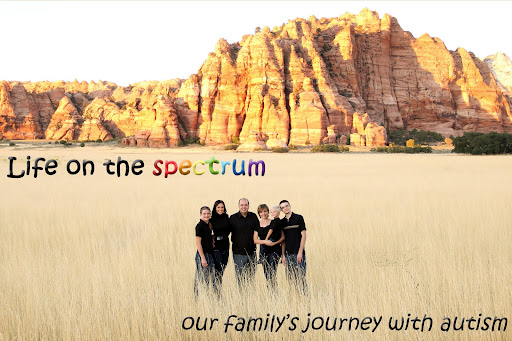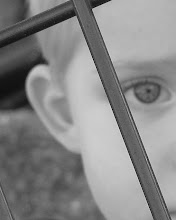Hi everyone, and welcome!
For some time, I have been contemplating the idea of creating a site to share my innermost thoughts, frustrations, and successes about my daily adventures with two autistic children. I have hopes that this blog may not only serve as my "sanity keeper" but also serve as a tool for others to share their stories as well. It's always nice to know there are others who are in the same boat and know EXACTLY what you are going through :)
As April is Autism Awareness Month, I thought it would be appropriate to share some information about the early signs to look for in young children. I firmly believe that the sooner any problem is found, diagnosed, and treated, the better the long-term outlook is. I know it would have been EXTREMELY helpful to our family if our teenager had been diagnosed with Asperger's Syndrome in early childhood rather than his mid-teen years. Luckily by the time our youngest was born, we knew what to look for; he is now in an early intervention program that is specifically addressing his sensory and social delays.
*Watch for the Red Flags of Autism*
(The following red flags may indicate a child is at risk for atypical development, and is in need of an immediate evaluation.)
In clinical terms, there are a few “absolute indicators,” often referred to as “red flags,” that indicate that a child should be evaluated. For a parent, these are the “red flags” that your child should be screened to ensure that he/she is on the right developmental path. If your baby shows any of these signs, please ask your pediatrician or family practitioner for an immediate evaluation:
No big smiles or other warm, joyful expressions by six months or thereafter
No back-and-forth sharing of sounds, smiles, or other facial expressions by nine months or thereafter
No babbling by 12 months
No back-and-forth gestures, such as pointing, showing, reaching, or waving by 12 months
No words by 16 months
No two-word meaningful phrases (without imitating or repeating) by 24 months
Any loss of speech or babbling or social skills at any age
*This information has been provided by First Signs, Inc. ©2001-2005. Reprinted with permission. For more information about recognizing the early signs of developmental and behavioral disorders, please visit http://www.firstsigns.org or the Centers for Disease Control at www.cdc.gov/actearly.
Here is a list of additional signs to watch for during the second year (13-24 mos.):
MOTOR:
*May exhibit toe-walking, rocking, head-banging, whirling without dizziness, hand-flapping, touches everything.
*Difficulty planning and sequencing movements, or move about without direction or purpose.
*Oblivious to people or objects when in motion
*Delayed motor skills
SENSORY-PERCEPTUAL:
*Withdraws from environmental stimulation
*Engages in self-stimulation
*Preoccupied with spinning objects
*Doesn't use gaze (eye contact) to regulate interaction (may turn away or move away when being touched and spoken to simultaneously)
SOCIAL-EMOTIONAL:
*Moves adult's hand like tool
*Insists on sameness and routine
*seems to prefer objects to people
*Doesn't bring objects to show caregiver
*Doesn't look to caregiver for approval, pleasure, or to indicate a desire
LANGUAGE/COMMUNICATION:
*Echolalia (echoing words and/or phrases), delayed echolalia unrelated to social context
*Pronoun reversals or omission
*Voice atonal, hollow, arrhythmic
*May not wave or say "hi" or "bye", or shake head yes or no
*May not point to gain caregiver's attention to desired object
*May not imitate sounds or words
*May not look to speaker when name is called
MENTAL REPRESENTATION:
*Little appropriate use of toys
*May not look at books
*May focus on repeated actions, routines (e.g., line up toys, dump baskets of small objects, repeat same button or lever on mechanical toy)
*Doesn't laugh appropriately at caregiver's humorous or surprise action
*Little endurance for persisting with an object or person
(information copyrighted by Barbara Kalmanson & Janet Green Babb, 2008)
I know this is a lot of information, but information equals empowerment for any parent!
Thursday, April 30, 2009
Subscribe to:
Posts (Atom)

